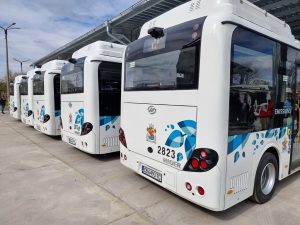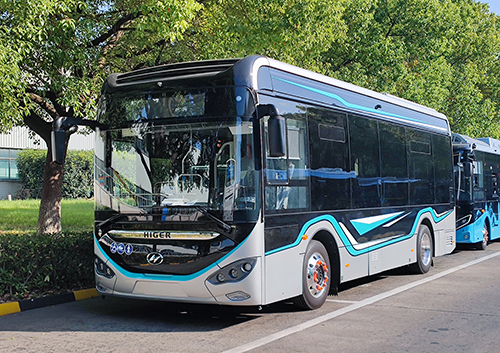Electric Buses Market Trends in Europe: 2022–2024
In 2022, the European electric bus market saw a total of 4,152 registrations, marking a 26% increase from the previous year. The United Kingdom led with 685 units, followed by Germany with 581 and France with 549. Notably, Yutong emerged as the top manufacturer, registering 479 buses and capturing an 11.5% market share.
The momentum continued into 2023, with a remarkable 53% growth, totaling 6,354 electric bus registrations across the EU27, Norway, Iceland, and Switzerland. Over 42% of city buses registered were zero-emission vehicles. The UK maintained its leading position with 1,206 new units, a 76.1% increase from 2022. Germany and Norway followed, with 753 and 493 registrations respectively. Spain and Italy also exhibited significant growth, with increases of 261% and 230.6% respectively.
By 2024, the market expanded by an additional 22%, reaching 7,779 electric bus registrations.
Registered Electric Buses by Country (2022–2024)
The following tables provide a detailed breakdown of electric bus registrations by country and manufacturer for the years 2022 and 2023. Data for 2024 is included where available.
Table 1: Electric Bus Registrations by Country (2022–2023)
| Country | 2022 Registrations | 2023 Registrations | Growth (%) |
| United Kingdom | 685 | 1,206 | +76.1 |
| Germany | 581 | 753 | +29.6 |
| Norway | Data not available | 493 | N/A |
| France | 549 | Data not available | N/A |
| Spain | Data not available | 261 | +261.0 |
| Italy | Data not available | 364 | +230.6 |
| Portugal | 52 | 364 | +600.0 |
| Belgium | 45 | 172 | +309.0 |
Key Observations
- Rapid Growth: The European electric bus market has demonstrated robust growth, with a 53% increase in 2023 and a further 22% in 2024.
- Regional Variations: Countries such as the UK, Germany, and Norway have led in absolute numbers, while nations like Portugal and Belgium have exhibited remarkable percentage growth, indicating a widespread commitment to electrification across diverse markets.
The data reflects a clear and accelerating shift towards electric buses in Europe, driven by environmental policies, technological advancements, and a collective move towards sustainable urban transport solutions.
What about Bulgaria?
 Bulgaria has been progressively integrating electric buses into its public transportation system, reflecting a commitment to sustainable urban mobility. Tracking the growth of registered electric buses in Bulgaria from 2022 through 2024 reveals a significant expansion in the country’s electric public transportation fleet. Below is a summary of key developments during this period:
Bulgaria has been progressively integrating electric buses into its public transportation system, reflecting a commitment to sustainable urban mobility. Tracking the growth of registered electric buses in Bulgaria from 2022 through 2024 reveals a significant expansion in the country’s electric public transportation fleet. Below is a summary of key developments during this period:
2022
- Sofia: In April 2022, the municipal operator Stolichen Avtotransport contracted Chariot Motors for 22 battery-electric buses, each 8.5 meters long. These buses were scheduled for delivery by the end of 2022.
- Sofia: Additionally, in April 2022, Karsan secured a tender to deliver 30 e-JEST electric minibuses to Sofia’s municipal operator. These deliveries were also planned for completion within 2022.
2023
- Sofia: By April 2023, Stolichen Avtotransport had integrated the 22 Chariot battery-electric buses into active service, operating on routes 23, 82, 100, and 101.
2024
- Burgas: The city incorporated 44 Irizar ie bus zero-emission electric buses into its public transport system. This fleet consisted of 34 units measuring 12 meters and 10 units of 18 meters.
- Kyustendil: In October 2024, the municipality announced a €2.6 million tender for the procurement of five electric buses (two 12-meter and three 9-meter) along with corresponding charging stations.
-
Year Registered electric buses Cities 2022 52 Sofia (22 Chariot + 30 Karsan) 2023 52 Sofia (in operation 23, 82, 100 и 101) 2024 99 Burgas (44 Irizar), Kyustendil (5 )
These instances highlight the progressive steps taken by Bulgarian municipalities toward electrifying their public transport fleets.





